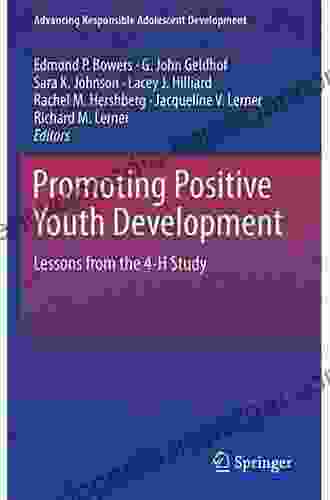Unlocking Youth Potential: A Comprehensive Guide to Promoting Positive Youth Development

Youth development is a critical aspect of society, shaping the future of our communities. Positive youth development focuses on nurturing the strengths, skills, and resilience of young people to help them thrive and reach their full potential. This guide aims to provide a comprehensive overview of the principles, strategies, and best practices for promoting positive youth development.
Defining Positive Youth Development
Positive youth development is a process that fosters the physical, emotional, social, and intellectual well-being of young people. It encompasses a wide range of factors, including:
- Resilience: The ability to bounce back from adversity and challenges
- Social-emotional learning: Skills such as self-awareness, empathy, and relationship-building
- Mentorship: Guidance and support from trusted adults
- Positive identity: A strong sense of self-worth and belonging
- Opportunities for growth: Access to education, extracurricular activities, and community involvement
Principles of Positive Youth Development
Four key principles guide positive youth development efforts:
- Focus on strengths: Build on the unique abilities and interests of young people.
- Create safe and supportive environments: Nurture a sense of belonging and provide opportunities for growth.
- Promote youth voice and participation: Encourage young people to take ownership of their development.
- Collaborate with families and communities: Engage parents, educators, and community organizations to support youth.
Strategies for Promoting Positive Youth Development
Numerous strategies can effectively promote positive youth development. These include:
1. Mentoring Programs
Mentoring programs pair young people with trusted adults who provide guidance, support, and role modeling.
2. Social-Emotional Learning Programs
These programs teach young people essential skills for understanding and managing their emotions, building relationships, and making responsible decisions.
3. Youth Development Programs
After-school and community-based programs offer a safe and structured space for youth to explore their interests, develop skills, and build friendships.
4. School-Based Initiatives
Schools can implement programs that foster positive peer relationships, promote mental health and well-being, and provide opportunities for leadership development.
5. Positive Youth Development Models
Models such as the 4-H Positive Youth Development Model provide a framework for promoting youth development through experiential learning and youth-led initiatives.
Best Practices for Positive Youth Development
For effective implementation, consider the following best practices:
- Engage youth: Involve young people in program planning and implementation.
- Foster a strengths-based approach: Build on the unique strengths of each young person.
- Create a safe and inclusive environment: Ensure all youth feel respected and valued.
- Provide opportunities for growth: Offer challenges and opportunities for youth to learn and develop.
- Collaborate with stakeholders: Engage parents, educators, and community organizations to support youth.
Promoting positive youth development is essential for building strong communities and empowering the next generation. By understanding the principles, strategies, and best practices outlined in this guide, practitioners, educators, and policymakers can effectively nurture the strengths and resilience of young people, helping them reach their full potential and create a brighter future.
Do you want to contribute by writing guest posts on this blog?
Please contact us and send us a resume of previous articles that you have written.
 Book
Book Novel
Novel Page
Page Chapter
Chapter Text
Text Story
Story Genre
Genre Reader
Reader Library
Library Paperback
Paperback E-book
E-book Magazine
Magazine Newspaper
Newspaper Paragraph
Paragraph Sentence
Sentence Bookmark
Bookmark Shelf
Shelf Glossary
Glossary Bibliography
Bibliography Foreword
Foreword Preface
Preface Synopsis
Synopsis Annotation
Annotation Footnote
Footnote Manuscript
Manuscript Scroll
Scroll Codex
Codex Tome
Tome Bestseller
Bestseller Classics
Classics Library card
Library card Narrative
Narrative Biography
Biography Autobiography
Autobiography Memoir
Memoir Reference
Reference Encyclopedia
Encyclopedia Julie Hay
Julie Hay Marsha Dean Phelts
Marsha Dean Phelts Margarita Gleba
Margarita Gleba Matthew A Cole
Matthew A Cole Will Durant
Will Durant Charles M Tatum
Charles M Tatum James Brogden
James Brogden Philip Zimbardo
Philip Zimbardo Donald M Truxillo
Donald M Truxillo Jeanette Winterson
Jeanette Winterson Miles Kington
Miles Kington Pietro Molla
Pietro Molla Dushyant Sukhija
Dushyant Sukhija Ernest Sosa
Ernest Sosa Christopher M Davis
Christopher M Davis Prudence M Rice
Prudence M Rice Brian Milton
Brian Milton David Kruh
David Kruh Adam Perkins
Adam Perkins Peter Jacobs
Peter Jacobs
Light bulbAdvertise smarter! Our strategic ad space ensures maximum exposure. Reserve your spot today!

 Oliver FosterHow to Become a Paramedic: A Comprehensive Guide to Starting Your Career in...
Oliver FosterHow to Become a Paramedic: A Comprehensive Guide to Starting Your Career in... Corey GreenFollow ·15.9k
Corey GreenFollow ·15.9k Cason CoxFollow ·8.9k
Cason CoxFollow ·8.9k Jackson HayesFollow ·18.3k
Jackson HayesFollow ·18.3k Corbin PowellFollow ·16.4k
Corbin PowellFollow ·16.4k Allen GinsbergFollow ·17.6k
Allen GinsbergFollow ·17.6k Gage HayesFollow ·6.3k
Gage HayesFollow ·6.3k John GreenFollow ·19.7k
John GreenFollow ·19.7k Diego BlairFollow ·2.8k
Diego BlairFollow ·2.8k

 Terence Nelson
Terence NelsonSocial Dynamics in Systems Perspective: New Economic...
The world we live in is a complex and...

 Deacon Bell
Deacon BellUnlock the Secrets of Treasury Process Internal Controls:...
In today's competitive business...

 Finn Cox
Finn CoxThe Path Ahead: Green Energy and Technology
Embark on the...

 Rob Foster
Rob FosterThermodynamics of Surfaces and Capillary Systems: A...
Surfaces and...

 Nathan Reed
Nathan ReedUnlock the Secrets to Writing Remarkable Business School...
Embarking on the journey to business...

 David Foster Wallace
David Foster WallacePrinciples and Applications, Second Edition: Your Gateway...
In the ever-evolving realm of...










